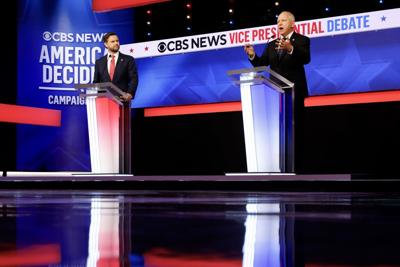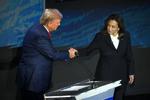Why the JD Vance and Tim Walz debate felt like it was from another time in America
There were times during the vice-presidential debate when the running mates for Donald Trump and Kamala Harris came across as men genuinely searching for middle-ground solutions

Republican vice-presidential candidate Sen. JD Vance and Democratic vice-presidential candidate Minnesota Gov. Tim Walz debate at the CBS Broadcast Center on Tuesday night.
This year’s American presidential debates have been marked by the stark differences that they put on display.
Joe Biden’s brain fog against Donald Trump’s bullhorn. Kamala Harris’s prosecutorial prowess against Trump’s claims of pet-eating migrants in Springfield, Ohio.
Tuesday night’s vice-presidential debate, which pitted Republican JD Vance against Democrat Tim Walz offered only one such cleavage on which they were “miles apart.” For the rest, the exchange was something more like a collaborative exercise than one of political contrast.
It was a conversation so cordial as to give rise among viewers and voters to temporary cases of contextual amnesia.
The CBS debate stage seemed several worlds removed from an America that is stickhandling hot wars in Ukraine and the Middle East, that has seen Trump the target of two assassination attempts, that too often appears to be on the brink of civil war.
The pre-debate pundits had predicted a punch-up between Vance, an Ohio Republican senator who went from a top Trump critic to an unabashed booster, and Walz, the folksy, rural Minnesota governor picked for his ability to roughen some of Harris’s refined California edges.
Rather than two pugilists seeking to sharpen the divisions in a play to undecided swing-state voters, the debate was more like a discussion between two politicians who were, for the most part, in genuine search of middle-ground solutions.
Instead of attacking controversial gun-control measures championed by Harris and Walz, Vance, who supports tighter security at schools than screening for gun owners, seemed genuinely crestfallen when Walz related an episode in which his 17-year-old son witnessed a shooting at a community centre while playing volleyball.
“I’m sorry about that and I hope he’s doing OK,” Vance said. “Christ have mercy. It is awful.”
And Vance found in his opponent a sort of ally when he was asked about difficulties accessing abortion procedures after Trump-appointed Supreme Court judges overturned the landmark Roe v. Wade decision.
Vance answered by referring to someone close to him who he said had an abortion to avoid raising a child with an abusive partner, and he spoke about the need to provide more government support to young women and young families.
“I agree with a lot of what Sen. Vance said about what is happening,” said Walz, Harris’s VP pick. “His running mate, though, does not, and that’s the problem.”
Vance did try to attack Walz over a Minnesota abortion law that, he initially charged, allowed a child who emerged alive from a “botched late-term abortion” to be denied life-sustaining medical care.
He was repeating accusations that Trump made during his debate with Harris last month and added that such an outcome would be “fundamentally barbaric.” But Vance abandoned his half-hearted fight when Walz insisted “that’s not true.”
Thanks to Walz, who related almost every question back to his personal experience teaching school or governing in Minnesota, viewers learned much — more, probably, than anyone would ever need to know — about the state of the state’s farms, child care and health-care services.
He did not, however, manage to hold Vance to account for propagating the baseless and explosive claims that irregular migrants had been stealing and eating family pets in Springfield, Ohio, or for attacking Harris as a ”childless cat lady” whose policies are “anti-family” and “anti-child.”
Thanks to Vance, viewers got a full-throated and significantly more eloquent explanation of Trump’s signature Make America Great Again economic policy.
Vance took aim at the “experts” under whose counsel U.S. industrial and manufacturing jobs were outsourced to countries such as China and Mexico with the promise of cheaper goods and a stronger middle class.
“They were wrong about the idea that if we made American less self-reliant, less productive in our own nation, that it would somehow make us better off,” said Vance, who drew numerous times on his own experiences growing up in poverty.
“And for the first time in a generation, Donald Trump had the wisdom and the courage to say to that bipartisan consensus: ‘We’re not doing it anymore. We’re bringing American manufacturing back, we’re unleashing American energy, we’re going to make more of our own stuff.’”
One could agree to disagree, as the two vice-presidential candidates did, on a number of issues, from immigration to climate change, health care and gun control.
But the contest was a battle of ideas and intellect, particularly compared to the heavyweight presidential debates.
Those battles between Trump and Biden, and later Harris, were bitterly fought. They employed fine-tuned slogans and retorts.
Biden’s campaign ended not due to the substance of anything he said, or tried to say. The 81-year-old was defeated, rather, by his own feeble performance and apparent physical frailty, after which his campaign essentially stopped receiving donations, forcing him to cede his place.
Harris provided a confident and well-delivered pitch to voters, but it was her facial gestures shown on the debate’s split-screen, as much as anything she said, that most effectively challenged Trump’s sometimes wild and often baseless assertions.
The results of both presidential debates were ultimately decided less on the fine-print details of any policy arguments but on emotive reactions to the candidates’ performances.
The VP debate offered none of that physical spectacle.
It was a cerebral affair, right up until the final question about the state of American “democracy” — a catch-all debate theme generally serving as code for Trump’s claims of election fraud, his role inciting the Jan. 6 rioters to attack the Capitol Building in 2021 to overturn the election results and the fears that it could happen all over again in the wake of the upcoming Nov. 5 presidential vote.
“When this is over, we need to shake hands ... and the winner needs to be the winner,” Walz implored. “This has got to stop. It’s tearing our country apart.”
Vance agreed to a postelection handshake and said that, “if Tim Walz is the next vice-president, he’ll have my prayers, he’ll have my best wishes and he’ll have my help whenever he wants it.”
But he wouldn’t go so far as to admit that Trump and the Republican party had any untoward role in casting doubt on the freeness or fairness of the country’s electoral system and instead accused Harris of engaging in “censorship at an industrial scale.”
“This is one (issue) we’re miles apart on,” Walz said, before honing in on Vance.
“Did (Trump) lose the 2020 election?” he asked.
“Tim, I’m focused on the future,” Vance said. “Did Kamala Harris censor Americans from speaking their minds in the wake of the 2020 COVID situation?”
“That,” Walz charged, “is a damning non answer.”



